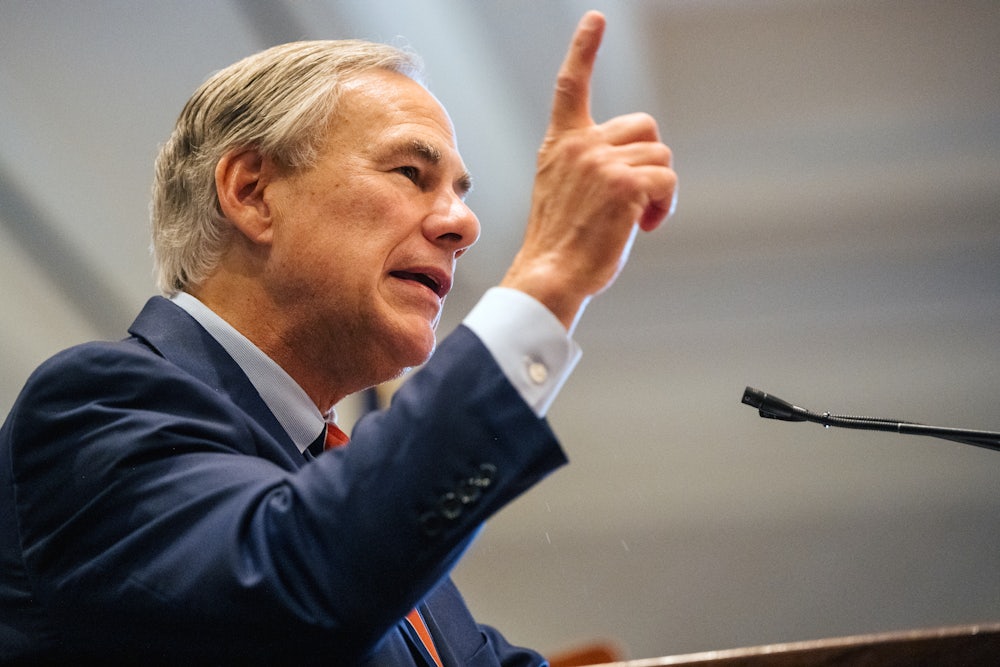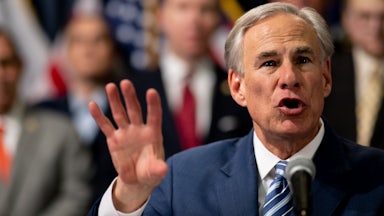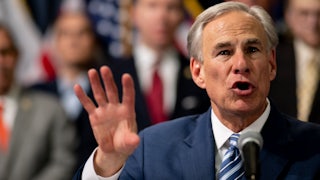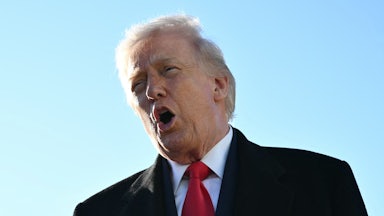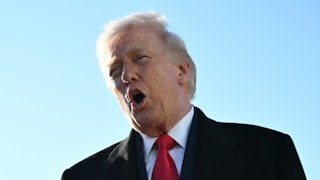On Wednesday, Texas’s ongoing spat with the federal government over border enforcement hit new heights of escalation. Governor Greg Abbott issued a statement arguing that the Biden administration’s inaction on border crossings had reached a level that justified extraordinary new steps by the Texas state government.
“The federal government has broken the compact between the United States and the States,” Abbott claimed. “The Executive Branch of the United States has a constitutional duty to enforce federal laws protecting States, including immigration laws on the books right now. President Biden has refused to enforce those laws and has even violated them. The result is that he has smashed records for illegal immigration.”
In response, Abbott said he was invoking a provision in the Constitution that he claimed “reserves to this State the right of self-defense.” The governor suggested the move would allow him to circumvent federal law by drawing upon constitutional powers reserved to the states. He did not specify how or when he would circumvent those laws.
“That authority is the supreme law of the land and supersedes any federal statutes to the contrary,” he claimed. “The Texas National Guard, the Texas Department of Public Safety, and other Texas personnel are acting on that authority, as well as state law, to secure the Texas border.”
It’s unclear what this means in terms of new actions beyond what Texas is already doing. Abbott’s reaction has nonetheless provoked criticism from Democrats and evoked other historical clashes between state and federal power, all of which was likely the governor’s intent. In practical terms, his declaration is more performative than substantive in nature. But it also runs the risk of turning into something uglier.
What is a state’s “right to self-defense”? The precise phrase does not exist in the Constitution itself, although some of its language hints at such a thing. Abbott’s statement is written in a dramatic and declaratory fashion, no doubt playing upon some Texans’ belief that they are more of an independent nation than an equal state in the Union. But the actual legal substance in his heady proclamation is threadbare.
Abbott referred to two particular provisions in the Constitution. One of them is in Article 1, which otherwise lays out the powers of Congress. It explicitly limits state powers by declaring that “no state shall, without the consent of Congress, lay any duty of tonnage, keep troops, or ships of war in time of peace, enter into any agreement or compact with another state, or with a foreign power, or engage in war, unless actually invaded, or in such imminent danger as will not admit of delay.”
In other words, the states cannot do a variety of things that are normally associated with being an independent country, like maintain armies and navies or conduct foreign relations, except in two circumstances: Congress gives permission for a state to do those things, or the state is under imminent attack. It reflects the eighteenth-century reality that the early United States did not maintain a large standing army and that communication took longer in the preindustrial world.
The other provision is in Article 4, which details the relationship between the federal government as a whole and the states. Its final provision, the guarantee clause, is a pledge to protect the American constitutional order. The federal government guarantees that each state shall have “a republican form of government,” meaning the U.S. shall not incorporate or tolerate nonrepublican states in the Union, and pledges to protect them “against invasion; and … domestic violence.” In short, Americans shall not live under foreign rule, mob rule, or monarchical rule.
In the Framers’ context, their fears were twofold: that the nascent United States could face attacks from covetous European powers like Britain and Spain, and that insurrections and rebellions could destroy the new country’s republican institutions from within. The latter fear of “domestic violence” was more acute when the Constitution was drafted: The Framers met in response to a tax rebellion in Massachusetts in 1786 and 1787 that the national government was powerless to stop under the Articles of Confederation.
“The tempestuous situation from which Massachusetts has scarcely emerged, evinces that dangers of this kind are not merely speculative,” Alexander Hamilton wrote in Federalist No. 21 to argue for the Constitution’s ratification. “Who can determine what might have been the issue of her late convulsions, if the malcontents had been headed by a Caesar or by a Cromwell? Who can predict what effect a despotism, established in Massachusetts, would have upon the liberties of New Hampshire or Rhode Island, of Connecticut or New York?”
In Abbott’s telling, these two provisions give Texas additional powers to combat undocumented immigration. “James Madison, Alexander Hamilton, and the other visionaries who wrote the U.S. Constitution foresaw that states should not be left to the mercy of a lawless president who does nothing to stop external threats like cartels smuggling millions of illegal immigrants across the border,” he argued in his statement on Wednesday.
Madison and Hamilton would have had to be incredibly far-sighted to foresee such a scenario, given that they had no concept of “illegal immigrants” at the time. The Nationality Act of 1790, the first federal law of its kind, limited citizenship by naturalization to “free white persons” but placed no condition on who could actually reside within the United States at first. Only much later did the federal government create a holistic immigration system to govern the flow of people over the borders. The Framers’ concerns at the time were centered on attacks by British and Spanish troops or Native American tribes, not unarmed civilians.
Abbott’s declaration appears to break new ground, constitutionally speaking. There does not appear to be a previous instance in American history in which a state and the federal government disagreed about an “invasion.” (State and federal officials famously disagreed about the “domestic violence” part during the Civil War.) And if Abbott tries to directly defy federal law or court rulings, it could trigger a constitutional crisis akin to the nullification battles of the nineteenth century and the desegregation fights of the twentieth.
But there are also reasons to believe this is more theatrical in nature. For one thing, Abbott already did this last year. His statement acknowledges as much in an inconspicuous way: “For these reasons, I have already declared an invasion under Article I, Section 10, Clause 3 to invoke Texas’s constitutional authority to defend and protect itself.” The “already declared” part took place in November 2022. Since then, Texas has engaged in unprecedented efforts to “secure” the border in the alleged absence of federal efforts to do so. Despite Abbott’s rhetoric, nothing actually changed this week from a legal or constitutional perspective.
Nor can it be said that Abbott is defying the Supreme Court in this matter, at least not yet. Former Texas Representative Beto O’Rourke claimed on Wednesday night that Abbott was “using the Texas Guard to defy a Supreme Court ruling” and suggested that Biden should federalize the state National Guard to overcome it. But Abbott is doing no such thing. The Department of Homeland Security v. Texas litigation was about a now-lifted injunction against the federal government, not Texas. Abbott is not currently defying the Supreme Court (or any other court, for that matter) because there are no significant orders or injunctions against Texas for him to defy.
So far, the actual goal of all of this appears to be transmuting a procedural loss at the Supreme Court into a campaign ad for Republicans and, in particular, Donald Trump. The former president has made the border a central pillar of his campaign and is pledging to militarize it and carry out mass deportations if reelected this year. Abbott’s statement reinforces Trump’s frequent claims that the nation is being “invaded” by foreign migrants—while pinning the blame on Trump’s likely 2024 opponent.
This theory is borne out by the actions of Republican lawmakers on Capitol Hill, who should theoretically be motivated to pass legislation to address a crisis that they often bring up. But that motivation is suddenly lacking. On Wednesday night, Senate Minority Leader Mitch McConnell reportedly told his fellow Republican senators that the time for a bipartisan package on Ukraine aid and immigration reforms had passed. “We don’t want to do anything to undermine him,” McConnell reportedly told his caucus, referring to Trump and his reelection chances.
Lawmakers had been negotiating for months in hopes of reaching a compromise that could pass both the GOP-led House and the Democrat-led Senate. But Republicans apparently scuttled those efforts to bolster Trump’s reelection chances, refusing to give anything resembling a political win to Biden. Utah Senator Mitt Romney, a frequent Trump critic, told reporters that his fellow Republican senators were effectively worsening the border crisis for partisan political gain.
I think the border is a very important issue for Donald Trump. And the fact that he would communicate to Republican senators and congresspeople that he doesn’t want us to solve the border problem because he wants to blame Biden for it is really appalling. But the reality is that we have a crisis at the border. The American people are suffering as a result of what’s happening at the border. And someone running for president ought to try and get the, you know, the problem solved, as opposed to saying, “Hey, save that problem. Don’t solve it. Let me take credit for solving it later.”
This is not to say that Abbott’s actions should be ignored or overlooked. As I noted yesterday, some of his fellow Republicans have actively (and mistakenly) encouraged him to defy the Supreme Court—an opportunity that hasn’t arisen here so far but may yet present itself in future litigation. That would raise the risk of a confrontation between federal and state officials that could amount to a constitutional crisis, bloodshed, or worse. While the Framers worried about foreign invasions, those provisions show they also feared reckless demagogues who would try to subvert the American constitutional order for personal gain.
